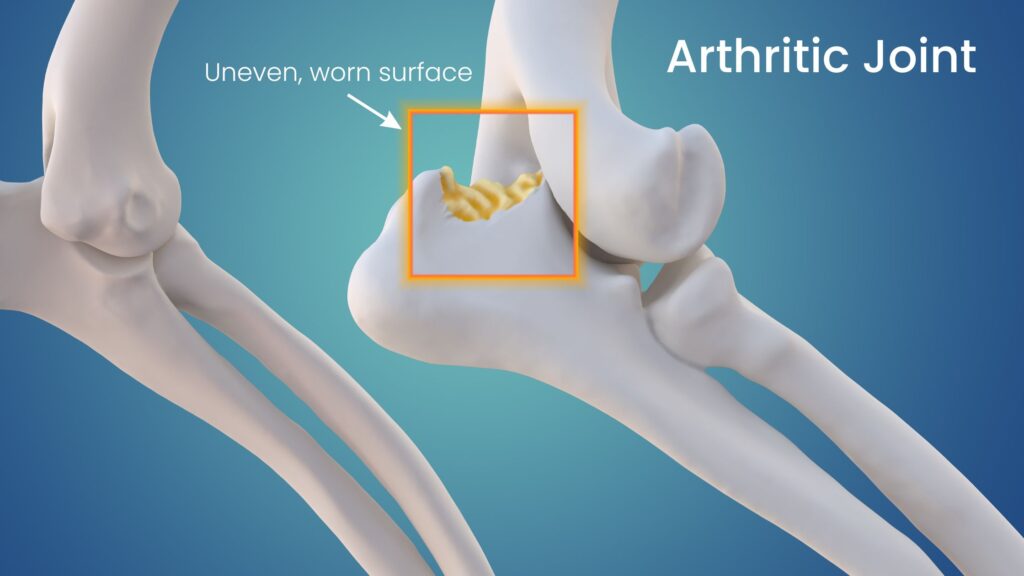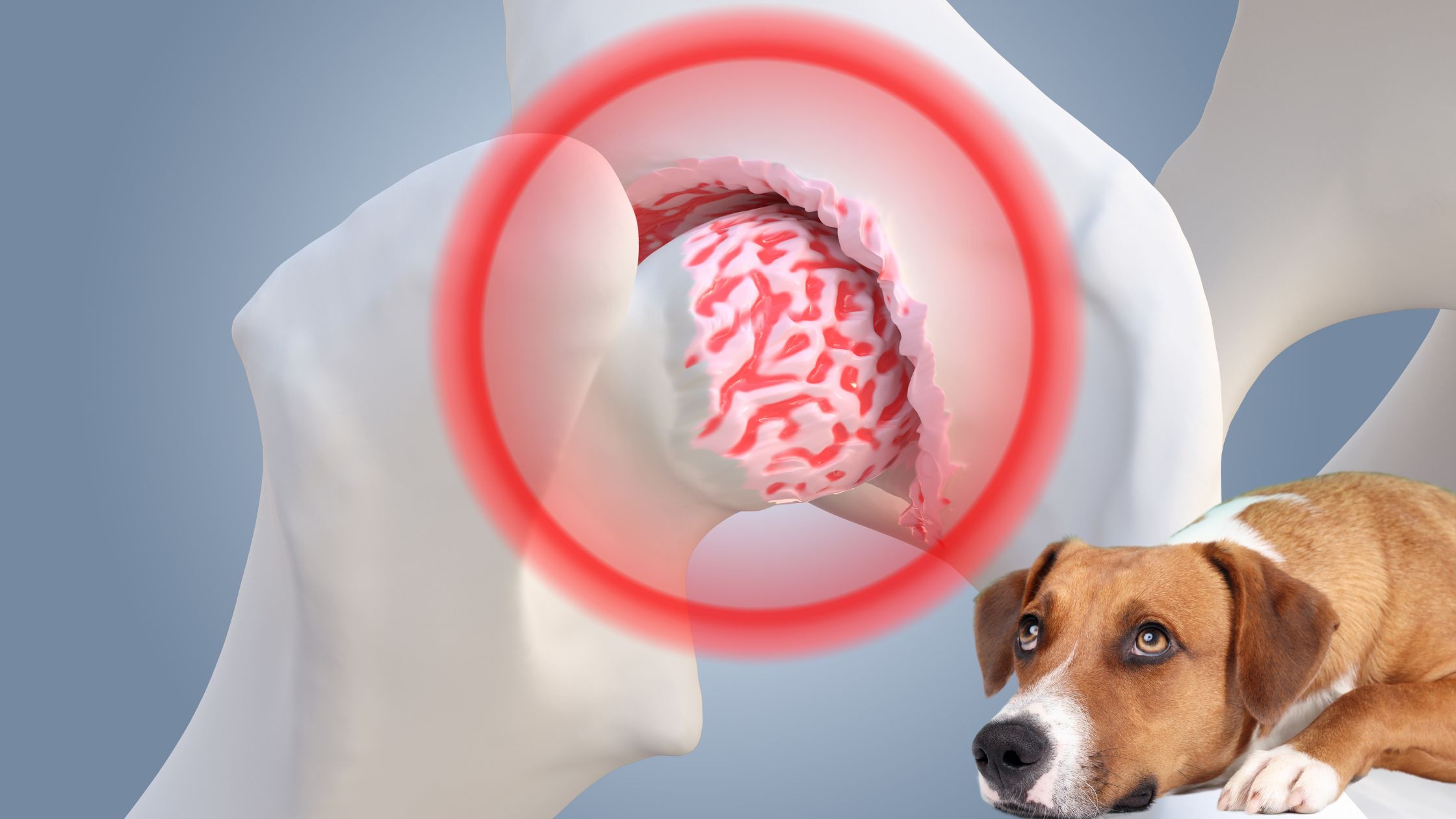Arthritis (osteoarthritis) is a very common condition that causes stiff, painful, swollen joints. Just like in us humans Arthritis makes moving around difficult and uncomfortable.
What is Arthritis?
Arthritis is inflammation of the joints and is a common problem in many dogs, causing pain, discomfort and stiffness. In dogs with arthritis, the cartilage in the joints (hips, elbows, etc.) changes or becomes damaged, making it less smooth and causing the bones and joints to rub against each other. This rubbing can cause discomfort or pain and can further damage the cartilage. As a direct result of this increased friction, new bone forms around the joint, making the joint stiffer and more difficult to move (known as osteoarthritis).
What causes Arthritis?
Arthritis is usually a problem in older dogs, but the condition can develop from an early age due to problems with bone and joint development. Depending on the cause, arthritis may affect one joint, or any number of your dog’s joints. Most cases develop as a result of abnormal rubbing within the joint caused by:
- Normal wear and tear can lead to arthritis later in life
- Joint instability
- Damage to or abnormal cartilage development
- Damage caused by trauma
- Abnormally shaped bones/ cartilage (Hip dysplasia or elbow dysplasia)

Genetics can be a factor in the cause of arthritis, some breeds of dogs are born with an increased risk of developing arthritis:
- Labradors (hips and elbows)
- Springer Spaniels (hips and elbows)
- German Shepherds (spine, hips and elbows)
- Golden Retrievers hips)
- Rottweilers (hips and elbows)
- Bernese mountain dogs (hips and elbows)

What are the signs that my dog has arthritis?
How are dogs diagnosed with arthritis?
Our vets can sometimes determine which joints are affected by pain and/or discomfort through examination, including joint flexion and extension. For an accurate investigation, we may recommend additional tests (e.g., X-rays) to help confirm and localise joint changes and sometimes also identify underlying causes. In some cases, a blood sample may be needed to rule out any medical conditions related to arthritis.
What is the treatment for arthritis?
Pain Relief
- Anti-inflammatory drugs (NSAIDs) reduce swelling and pain. They are usually given as an ongoing daily dose, or in pulses for a few weeks at a time.
Weight Loss
Arthritis is commonly worse in overweight and unfit dogs, so the most important therapy is the combination of weight control and exercise management: minimising load on the joints, and maximising the range of movement and fitness of the muscles around those joints.
Joint Supplements
- Joint supplements are not a replacement for medications, and don’t work for all dogs.
- Joint supplements can be used at the same time as most other medicines.
- There are many joint supplements of varying quality on the market.
Please take precaution and check with your vet before administering any supplements to your pet. We offer free Nurse clinics to advise and help you with your choices.
Hydrotherapy
Hydrotherapy can be a useful exercise that doesn’t put too much strain on joints. Your vet will be able to advise an appropriate hydrotherapy centre.
Surgery
If your dog’s arthritic pain is severe and uncontrollable, joint surgeries such as fusion (arthrodesis) or replacements may be considered.
Please contact the practice if you require a consultation to go through your options.
Can Arthritis be cured?
Unfortunately there isn’t a cure. Once the cartilage in a dog’s joints is damaged, it rarely completely repairs itself. However, many animals can escape pain through appropriate long-term medication and careful management to control worsening of the condition. Given the severity of arthritis in many patients, many dogs can live well, active, full lives without needing any veterinary intervention. However, some patients will require treatment ranging from simple lifestyle changes to complex surgery.
Caring for your dog at home:
There are plenty of things you can do to ensure your pet is comfortable at home:
Controlled walks
- Unless advised otherwise by your vet, you can walk your dog, always keep the walks short but on a daily basis. Never go beyond their limit a sudden increase in exercise could make your dog still and cause them pain.
Keep them moving
- Unless advised otherwise by your vet, encourage your dog to move around throughout the day, lying down for hours can cause joints to stiffen, so a little movement here and there can help.
Comfortable bedding
- Memory foam beds are kind to joints, always allow your dog to get comfortable in a position and bed of their choosing.
Keep them warm
- A heat pad under your dog’s bed may give them extra comfort, especially on cold days. Remember heat soothes painful joints.
- Always dry your dog after wet walks.
Provide a safe environment
- Rugs, carpets and anti-slip mats will provide stability when your dog is walking around the house.
- Dogs with arthritis have weak muscles and are prone to slipping, which can cause further injury.
How to help prevent arthritis?
We do offer weight and diet management nurse clinics for free, if you have any concerns, please book an appointment to see one of our lovely nurses.
Thanks for reading, until next time…

